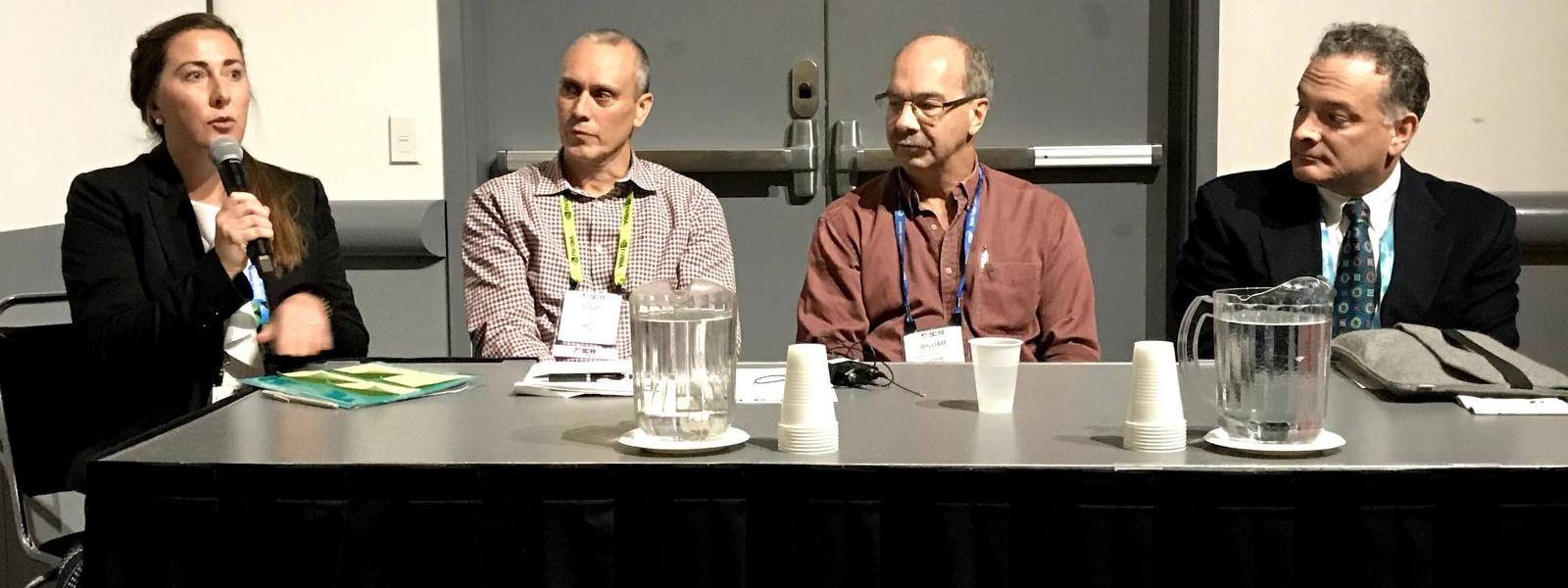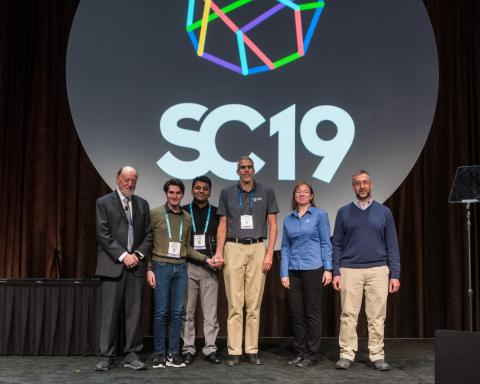
The Computational Approaches for Cancer Workshop at SC20 fosters collaborations and future innovations to better understand, diagnose, treat, and prevent cancer.
On Nov. 13, clinicians, cancer biologists, mathematicians, computational scientists, biomedical engineers and data scientists worldwide will participate in the Sixth Computational Approaches for Cancer Workshop (CAFCW), a virtual workshop at SC20, the leading and largest international conference for high performance computing, networking, storage, and analysis.

Warren Kibbe, former director of the National Cancer Institute Center for Biomedical Informatics and Information Technology, presenting during the 2019 Computational Approaches for Cancer Workshop.
The Frederick National Laboratory for Cancer Research (FNL) co-founded the workshop in 2015. Eric Stahlberg, Ph.D., director of FNL’s Bioinformatics and Data Science program, is the workshop’s lead organizer.
“SC20 is an ideal conference to spotlight the impact of interdisciplinary efforts in cancer research,” Stahlberg said. “This workshop provides opportunities to bridge the high performance computing community with the cancer research community.”
Due to the growth in collaborative opportunities for computational approaches in cancer research, Stahlberg said they received a record number of abstracts this year. Participants include first-time presenters from the broader academic community and members of the National Cancer Institute and Department of Energy (NCI-DOE) collaboration who are working in multidisciplinary teams to advance cancer research at the frontiers of computing.
All-day program featuring plethora of presentations
This year’s event also brings focus on the convergence of high performance computing, cancer research and COVID-19. The all-day workshop includes three panels, 11 presentations, and 17 poster presentations. During the lunch break, attendees can engage informally with other attendees via WebEx breakout groups.
In his keynote remarks, NCI Director Norman “Ned” Sharpless, M.D., will highlight computational solutions inspired by cancer challenges that are being employed in the battle against COVID-19.
The panels will discuss:
-
Lessons from COVID-19 that can be applied to cancer research.
-
Digital twins for cancer care.
-
Translating cancer research advances in artificial intelligence into clinical practice.
Anyone interested can register for CAFCW before Nov. 13 to attend the live event, scheduled for 10 a.m. to 6:30 p.m. Eastern Standard Time. Workshop registration is $50.
The workshop will be recorded and rebroadcast beginning at 10 a.m. Japan Standard Time. Following the workshop, much of the content will also be available on-demand via the Virtual Event Portal for six months. Post-workshop registrations must be made by Dec. 7.
Workshop fosters interdisciplinary dialogue and successful collaborations

CAFCW originated in early 2015 when organizers observed that although healthcare topics were broadly part of the SC conference, there was limited focus on the growing convergence of cancer and advanced scientific computing. Since its inception, the workshop has fostered dialogue and connections among researchers interested in computationally and data-driven cancer research and clinical applications.
Presenting regularly at the CAFCW workshop, the Joint Design of Advanced Computing Solutions for Cancer, a NCI-DOE collaboration, has offered previews to recent progress and upcoming efforts.
Last year, the collaboration’s Pilot 2 (RAS) Team submitted a conference paper that won the 2019 Supercomputing Best Paper Award, a prestigious, peer-reviewed industry distinction.
The RAS team’s paper was selected from 344 conference paper submissions worldwide. Dwight Nissley, Ph.D., director of FNL’s Cancer Research Technology Program, and Fred Streitz, Ph.D., chief scientist of the Artificial Intelligence and Technology Office at the US Department of Energy, co-lead Pilot 2.
This year’s program also includes insight into progress with the Accelerating Therapeutics for Opportunities in Medicine (ATOM) Consortium, a public-private, multidisciplinary partnership aiming to transform drug discovery by accelerating the development of more effective therapies for patients. FNL was one of ATOM’s founding members.
Benjamin Madej, FNL’s lead data scientist at ATOM, and Amanda Paulson, ATOM fellow, will deliver presentations at the workshop.
Fostering global opportunities across career stages

The CAFCW program committee is devoted to providing opportunities for future scientists. This year for the first time, an undergraduate student, Sneha Jariwala, Department of Biomolecular Engineering, University of California, Santa Cruz, will present a poster, and CAFCW is sponsoring her attendance. In addition, all students who attend the virtual SC conference will be invited to attend the CAFCW poster session.
After the workshop, the CAFCW organizing committee will invite all presenters to submit papers for a special issue of BMC Bioinformatics, an open-access journal.
The CAFCW organizing committee includes Stahlberg; Sally Ellingson, University of Kentucky; Sean Hanlon, National Cancer Institute; Patricia Kovatch, Icahn School of Medicine, Mount Sinai; and Petrina Hollingsworth and Lynn Borkon, both from FNL. Program contributors include international participants from Japan and Norway, with abstract submissions from multiple nations including Norway, the Czech Republic, Oman, the United Kingdom and India.
Media Inquiries
Mary Ellen Hackett
Manager, Communications Office
301-401-8670
